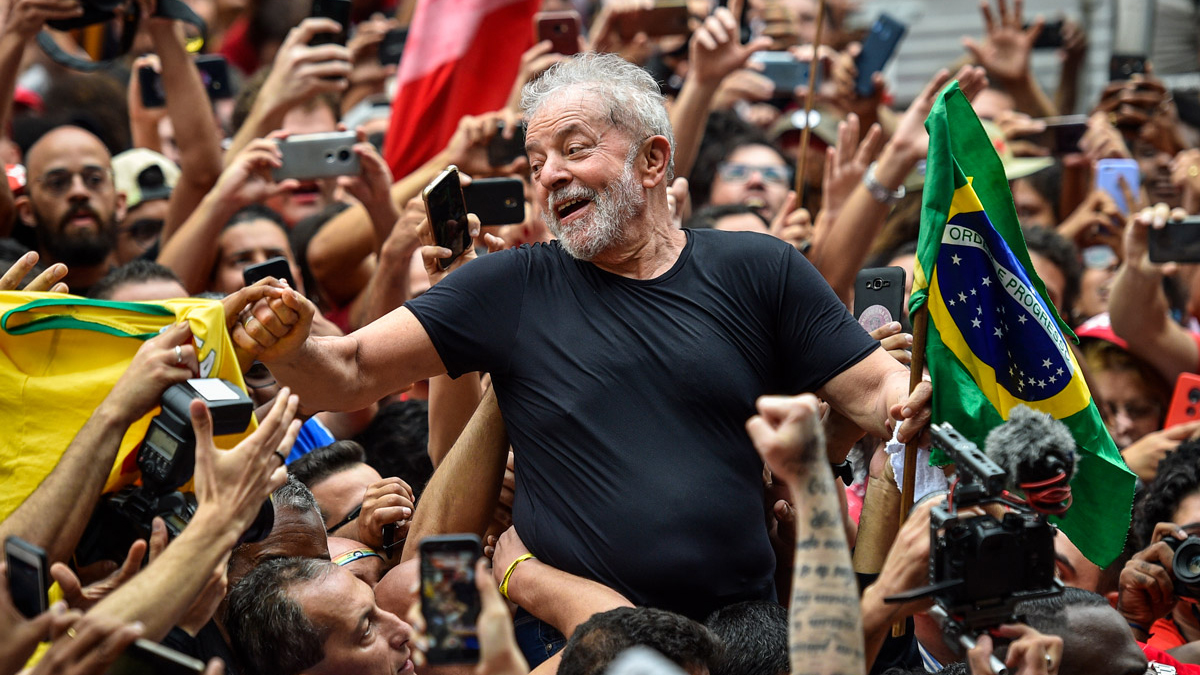The socialist leader, who was imprisoned for 580 days, is once again the favorite of Brazil: Who is Lula da Silva?
Left-wing Lula da Silva, who served as the president of Brazil from 2003 to 2010, was convicted of passive corruption and money laundering, was arrested on 7 April 2018 and sent to prison and was released on 8 November 2019 after 580 days in prison.

In March 2021, the verdicts he received from the Lula da Silva corruption cases were annulled, paving the way for him to participate in the elections.
May 2022
Brazilian left-wing leader Luis Inácio Lula da Silva launched his campaign for the presidential election scheduled for October with the slogan of "rebuilding" the country after the "irresponsible and criminal" administration of President Jair Bolsonaro.
"We are all ready to work not only for victory, but also for rebuilding and change in Brazil, which will be more difficult than the elections," Lula, 76, told nearly 4,000 supporters in Sao Paulo.
Twelve years after leaving power, the ex-unionist is running for a third term without any challenge for leadership of the left.
The leader of the Workers' Party, who has tremendous stamina and weight in the Brazilian political scene, which he held two terms of presidency between 2003 and 2010, is running for the presidency for the sixth time.
The presidential elections, to be held on October 2 and 30, will reveal the extreme polarization of the colossal country with a rising population of 213 million.
The leftist candidate asked his supporters, “What do we want? Brazilian democracy or authoritarianism? “The choice has never been so simple.”
History
Lula, who is shown as one of the symbols of the left in Latin America and is also a former union president, was accused of bribery and corruption as part of the largest corruption operation in Brazilian history, "Car Wash Operation." Lula, who was convicted of "taking bribes" from a construction company in 2017 and sentenced to 12 years in prison, was also accused of "corruption" by another court in 2018 and was given a nearly 13-year prison sentence.
Lula, who denied all bribery and corruption charges against him and argued that these accusations were made to prevent the current Brazilian President Jair Bolsanoro from participating in the 2018 elections, was released in November 2019 after spending 580 days in prison.
First presidential term
He was elected President of Brazil in 2002. He took over the presidency on January 1, 2003. Lula is a founding member of the Brazilian Workers' Party (Partido dos Trabalhadores, PT). He later incorporated the nickname "Lula", meaning squid in Portuguese, into his official name. Lula has been married to Marisa Letícia since 1974 and they have five children.
Youth
Lula da Silva was born in Caetés, in the province of Pernambuco. He grew up in São Paulo from 1952. He was the seventh child of eight children, Aristides Inácio da Silva and Eurídice Ferreira de Mello. Due to poverty, he was unable to attend school very little, and from the age of 12, he worked in various jobs such as shoe shine, postman, laundry worker.
He then started working in a metal factory and studied metalworking. After 1966 he started working in large metalworks in São Bernardo do Campo.
Unionism and an introduction to politics
Lula, who joined the union movement through his brother, was elected head of the regional group of the metal workers union in 1969. In 1975, he became the union president with 92% of the votes and started to represent 100,000 workers.
From the 1970s, Lula was involved in organizing trade union activities, including large-scale strikes. He was arrested, kept in detention for a month. Upon the failure of the strikes, he founded the Workers Party (Partido Trabalhadores, PT) on February 10, 1980, together with other trade unionists, intellectuals and representatives of different segments of society. As early as 1982, the PT expanded across the country and reached 400,000 members.
In 1986, Lula was elected to the Brazilian congress. Actively participating in the preparation of the new civilian constitution, the PT succeeded in securing important gains regarding workers' rights. However, he could not show the same success in matters such as land ownership. In 1989, Lula participated in the presidential elections with a socialist program as the candidate of the PT. However, he was not elected as a result of the opposition of the capital circles.
Lula also participated in all subsequent presidential elections. In the 2002 election campaign, the worker changed his image and wore a suit for the first time. He also stopped emphasizing his demands that Brazil should not pay its foreign debts. Instead, the fight against hunger and poverty and better education opportunities came to the fore in its program. In addition, he gradually started to develop a relationship of trust with his capital circles. This was followed by gaining the confidence of the International Monetary Fund (IMF).
Presidential
Lula successfully completed the run-off elections held on 27 October 2002 against José Serra, the candidate of the Social Democratic Party of Brazil (Partido da Social Democracia Brasileira - PSDB), and became President of Brazil, replacing Fernando Henrique Cardoso, who had been president since 1995.
Lula, who was also the governor of Mato Grosso and was widely criticized for his closeness with the industrialist Blairo Maggi, whom Greenpeace blames for the destruction of the Brazilian rainforest, successfully resumed his presidency in the 2006 elections against his rival, social democrat Geraldo Alckmin.
